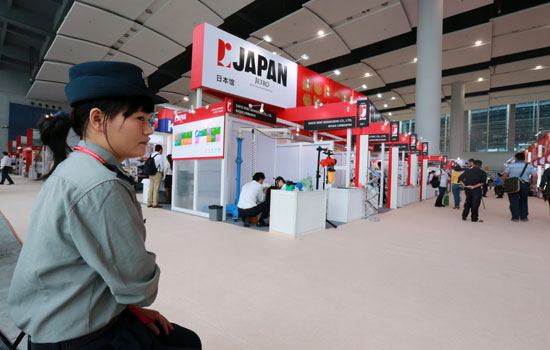Japanese exhibitors at the China Import and Export Fair are worried about the possibility of sluggish business in China amid rising anger over Japan's illegal "purchase" of China's Diaoyu Islands.
|
 |
|
A hall featuring Japanese exhibitors at the Canton Fair, which opened in Guangzhou, Guangdong province, on Monday. [Photo/China Daily] |

For the first time Japan has organized a business delegation, including more than a dozen Japanese manufacturers, to visit China's largest trade event, the Canton Fair, which acts as a barometer of China's foreign trade.
Kenichi Hayashi, assistant manager of Sasaki Corp's overseas division, said the row between China and Japan over the Diaoyu Islands will affect its business in the Chinese market.
The Japanese company, which specializes in agricultural and environmental machinery, has opened a manufacturing base in Suzhou in East China's Jiangsu province, Hayashi said.
"We are here to meet more potential Chinese buyers for our advanced agricultural machines. But the number of visitors today is not as big as we had expected," he said.
Hayashi said the company's business in China has not been affected by the row over the Diaoyu Islands, but there could be a slowdown if the dispute continues.
"We are really afraid that China will cut some preferential policies for us Japanese manufacturers," he said.
Hayashi said the company's sales in China were valued at more than $5 million last year.
"China is speeding up its urbanization process, which has forced many rural people to move to cities. Our products, with high automotive ability, will meet the need in the country's rural areas," he said.
Most of the company's products, including harvesting machines and cultivators, benefit from China's farm machinery subsidy policy.
In February, the Chinese government said it will continue to subsidize farmers' machinery purchases this year to free up more rural labor and boost grain production.
A statement by the Ministry of Agriculture and the Ministry of Finance said the government has set aside at least 13 billion yuan ($2.1 billion) in subsidies for agricultural machinery purchases this year.
Hayashi said: "We hope that the dispute over the Diaoyu Islands will be solved as soon as possible. Sluggish demand for our products will be expected if the Chinese government cuts the subsidies."
Sales of a variety of Japanese goods, especially cars, have been hit hard in the Chinese market due to the islands dispute.
Last month, the number of Japanese vehicles sold in China was about 160,000, 29.49 percent lower than in August, and down 40.82 percent year-on-year, the China Association of Automobile Manufacturers said.
Hayashi said: "We hope to rebuild purchasing confidence from Chinese customers at the fair. Business should be separated from the islands dispute."
The fair opened on Monday in Guangzhou, the capital of Guangdong province. More than 500 companies from 44 countries and regions have set up booths in the import zone during the event, the fair's organizing committee says.
Liu Jianjun, a spokesman for the fair, said the number of Japanese buyers will be slightly down following the Diaoyu Islands row.
"It is predicted that Chinese exporters will also find some difficulties in tapping the Japanese market," Liu said.
He said the Diaoyu row will deal another setback to China's foreign trade, which has already been hit hard by the global economic downturn.
"Japan is a traditional export destination for Chinese manufacturers. Some exporters have adopted a wait-and-see attitude toward doing business with Japanese clients," he said.
Liu, along with some industry experts and trade officials, are not optimistic about China's current trade situation, although figures last month showed some positive signs.
Ding Shican, a marketing manager for GSP Automotive Group Wenzhou Co Ltd in Zhejiang province, said goods being shipped to Japan recently have undergone stricter checks by Chinese customs officers.
"Also, Chinese customs have strengthened efforts to check imported goods from Japan. We have bought some auto samples from Japan and we are required to submit more documents," Ding said.
"The stricter checking process, to some extent, will affect our business in Japan, given that it is one of the important markets for us," Ding said.
qiuquanlin@chinadaily.com.cn
